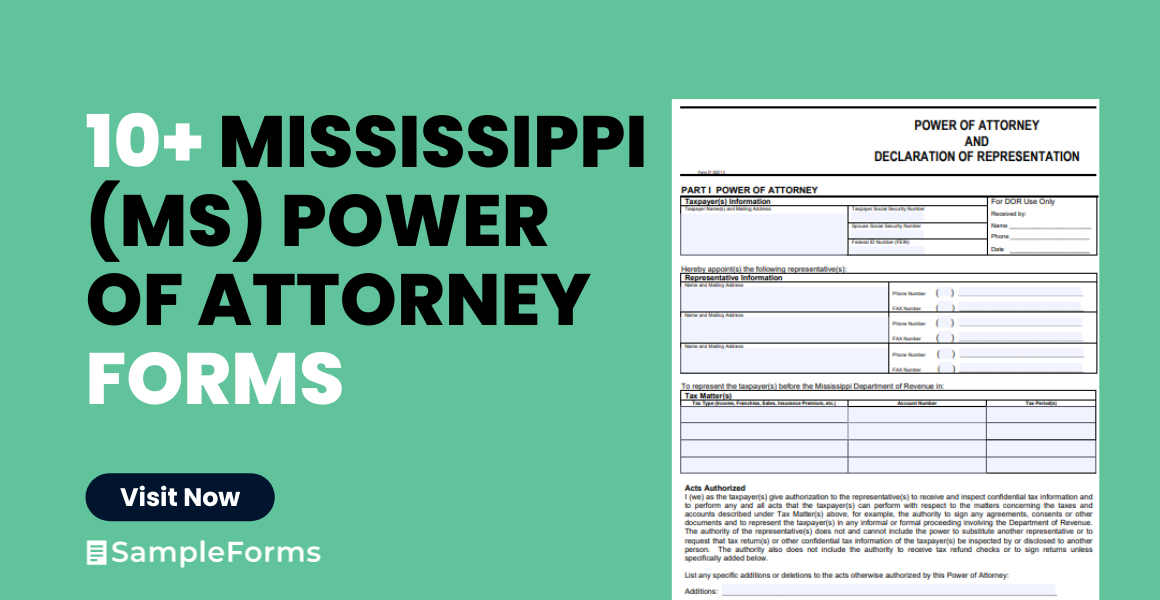Navigating the Mississippi Power of Attorney (POA) process can be straightforward with the right guidance. Our comprehensive guide offers essential tips and insights on effectively using the Mississippi POA form. Whether for financial, healthcare, or legal decisions, understanding how to properly fill out, execute, and utilize this crucial legal document is key. Dive into our expert advice to ensure your POA aligns perfectly with your needs and complies with Mississippi state laws.
What is the Mississippi Power of Attorney Form
The Mississippi Power of Attorney Form is a legal document that allows an individual, known as the principal, to designate another person, called the ‘agent’ or ‘attorney-in-fact’, to make decisions on their behalf. This form can cover various areas such as financial matters, healthcare decisions, or general affairs. It’s used when the principal cannot manage their affairs due to absence, illness, or other reasons, ensuring their matters are handled as per their wishes.
What is the Best Sample Mississippi Power of Attorney Form?
The best sample Mississippi Power of Attorney (POA) form is one that is comprehensive, legally compliant, and tailored to the specific needs of the individual. It should clearly outline the powers granted to the agent, include necessary legal terms, and adhere to Mississippi state laws. Here’s a simplified example:
Mississippi Power of Attorney Form
Principal’s Information:
- Full Name: _________________
- Address: ___________________
- Contact Number: ____________
Agent’s Information:
- Full Name: _________________
- Address: ___________________
- Contact Number: ____________
Powers Granted:
- Financial Decisions
- Real Estate Management
- Healthcare Decisions
- Business Operations
- Other: _________________
Specific Limitations (if any):
Effective Date:
- Immediate / Upon Disability or Incapacity (circle one)
- Date: _________________
Duration:
- Indefinite
- Specific End Date: _________________
Third Party Reliance:
- I, [Principal’s Full Name], authorize any third party who receives a copy of this document to act under it.
Signatures:
- Principal’s Signature: ___________________ Date: ___________
- Agent’s Signature: ______________________ Date: ___________
Witnesses (if required):
- Witness Name: _________________ Signature: _______________ Date: ___________
- Witness Name: _________________ Signature: _______________ Date: ___________
Notarization (if required): State of Mississippi, County of _______________ On this, the ___ day of ________, 20, before me, [Notary’s Name], personally appeared [Principal’s Name], known to me (or satisfactorily proven) to be the person whose name is subscribed to the within instrument, and acknowledged that they executed the same for the purposes therein contained.
In witness whereof, I hereunto set my hand and official seal.
Notary Public: _______________________ My Commission Expires: _______________
Note: This form should be tailored to fit individual circumstances and it is recommended to consult with a legal professional to ensure compliance with Mississippi state laws
1. State of Mississippi Power of Attorney Form
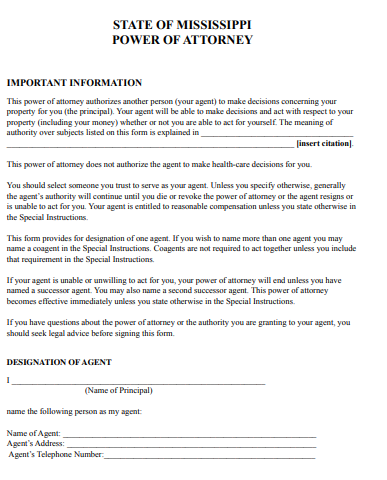
2. Mississippi Vehicle Power of Attorney Form
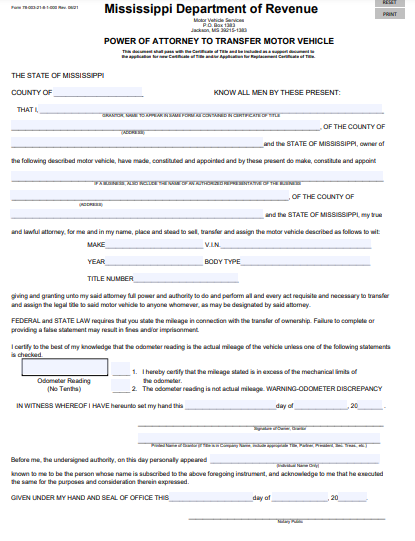
3. Mississippi Statutory Power of Attorney Form
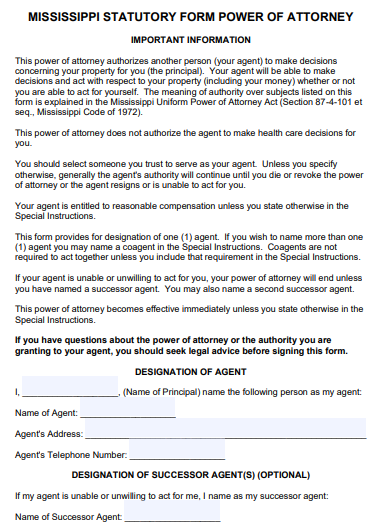
4. Mississippi Simple Power of Attorney Form
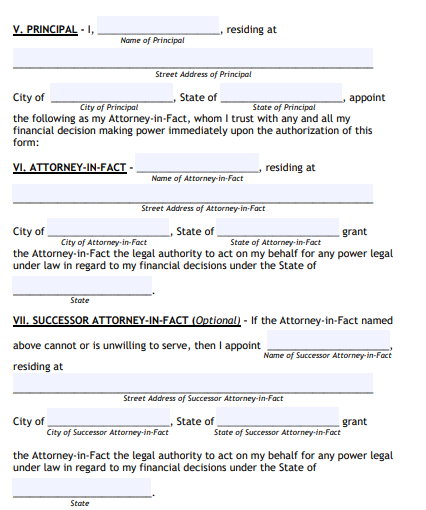
5. Mississippi Power of Attorney Form
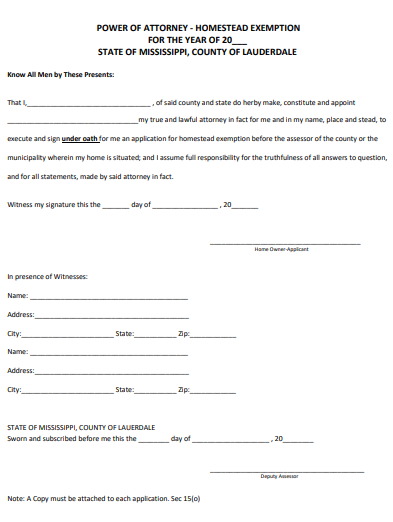
6. Mississippi Power of Attorney Form of Minor Child
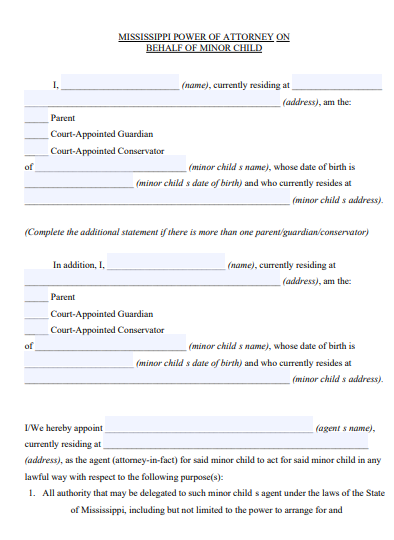
7. Mississippi Health Care Power of Attorney Form
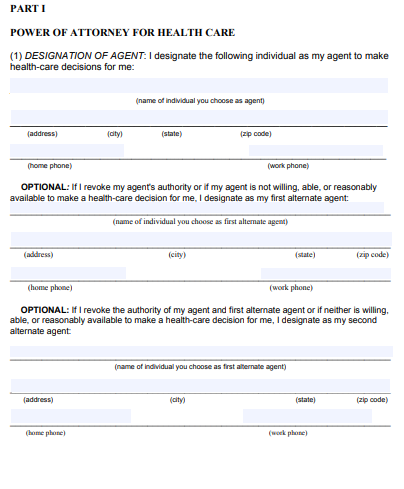
8. Mississippi General Power of Attorney Form
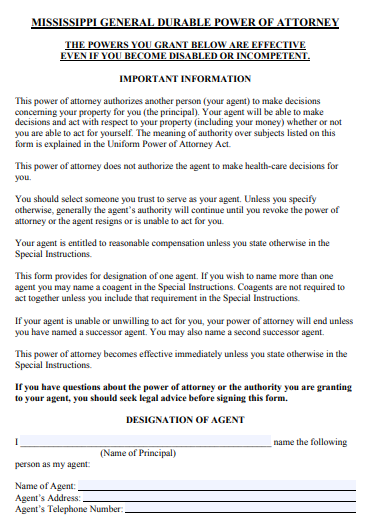
9. Mississippi Free Power of Attorney Form
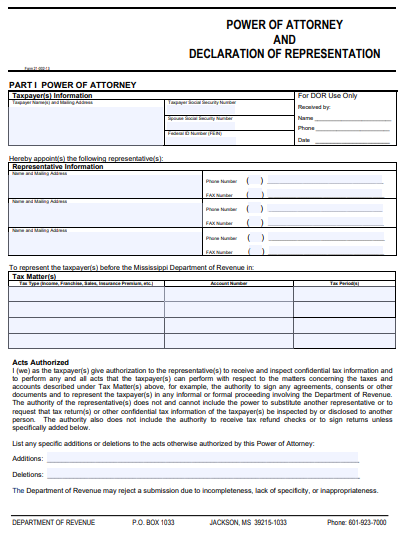
10. Mississippi Financial Power of Attorney Form
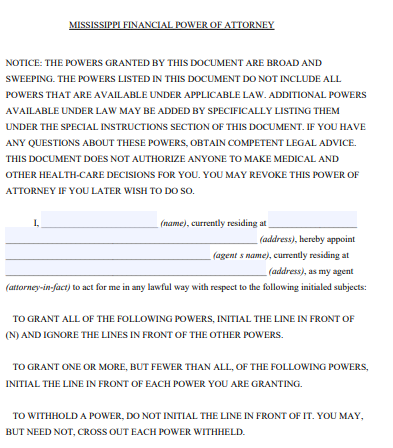
11. Mississippi Durable Financial Power of Attorney Form
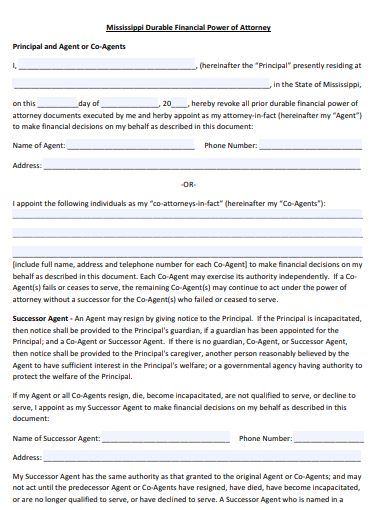
How Do I Get Power of Attorney in Mississippi?
To obtain a Power of Attorney in Mississippi, select a trusted agent, complete the POA form detailing the powers granted, and ensure it meets legal requirements. Sign it in the presence of a notary or witnesses, as required by Mississippi law. Regular review and updates are recommended for continued relevance and compliance.
Examples:
- Selecting an Agent: Choose someone trustworthy, like a family member or close friend, to act on your behalf.
- Filling the Form: Use a state-specific POA form, ensuring all sections are completed accurately.
- Specifying Powers: Clearly outline the scope of powers, whether financial, healthcare, or other areas.
- Legal Validation: Sign the form in front of a notary public or required witnesses to make it legally binding.
- Safekeeping and Copies: Store the original document safely and provide copies to relevant parties, like your bank or doctor.
What is a Statutory Form of Power of Attorney in Mississippi?
A statutory form of power of attorney in Mississippi is a standardized document provided by the state, outlining the powers an agent can exercise. It’s designed to simplify the process and ensure legal compliance, covering a range of standard powers suitable for most situations.
Examples:
- Financial Decisions: Managing bank accounts, investments, and property transactions.
- Healthcare Choices: Making medical decisions if the principal is incapacitated.
- Real Estate Management: Handling buying, selling, or maintaining real estate.
- Government Benefits: Applying for or managing government benefits like Social Security.
- Legal Matters: Representing the principal in legal proceedings or negotiations.
What is the Form for Power of Attorney for Mississippi Income Tax?
The form for Power of Attorney for Mississippi Income Tax is a specific document authorizing an agent to handle tax-related matters with the Mississippi Department of Revenue. It grants the agent authority to access tax records, file taxes, and make decisions regarding tax payments and disputes.
Examples:
- Filing Taxes: Submitting income tax returns on behalf of the principal.
- Tax Disputes: Representing the principal in any tax-related disputes or audits.
- Tax Payments: Making decisions about tax payments and arrangements.
- Accessing Records: Obtaining tax records and information from the state.
- Amending Returns: Making necessary amendments to previously filed tax returns.
Does a Will Have to be Notarized in Mississippi?
In Mississippi, a will does not have to be notarized to be valid. However, it must be signed by the testator and witnessed by at least two individuals. Notarization can make the will self-proving, which speeds up the probate process.
Examples:
- Witnessed Signing: Having two witnesses present during the signing of the will.
- Self-Proving Affidavit: Adding a notarized affidavit to make the will self-proving.
- Holographic Wills: Handwritten wills, which must be entirely in the testator’s handwriting.
- Updating a Will: Regularly reviewing and updating the will to reflect current wishes.
- Legal Consultation: Seeking legal advice to ensure the will meets all state requirements.
What is a Limited Power of Attorney in Mississippi?
A limited power of attorney in Mississippi grants an agent specific, restricted powers for a particular task or time period. It’s used for targeted purposes, ensuring the agent’s authority is confined to precise activities or decisions.
Examples:
- Real Estate Transactions: Authorizing an agent to handle a specific property sale.
- Business Dealings: Granting powers for a particular business negotiation or transaction.
- Medical Decisions: Allowing decisions for a specific medical procedure or treatment.
- Financial Tasks: Assigning authority for a single financial transaction, like selling stocks.
- Temporary Authority: Granting powers for a defined period, such as during a trip abroad.
What is a Minor Power of Attorney in Mississippi?
A minor power of attorney in Mississippi allows parents to grant an agent temporary authority to make decisions for their child, typically in their absence. It covers areas like healthcare, education, and general welfare.
Examples:
- Healthcare Decisions: Making medical choices for the child during the parents’ absence.
- Educational Matters: Handling school-related decisions, including enrollment and activities.
- Emergency Situations: Acting on behalf of the child in urgent scenarios.
- Day-to-Day Care: Managing everyday care and decisions for the child.
- Travel Consent: Providing authorization for the child to travel with the agent.
Can Minor Give Special Power of Attorney?
A minor (person under the age of 18) typically cannot give a special power of attorney, as they are not legally considered competent to enter into such agreements. Legal authority and decision-making for minors usually rest with their parents or legal guardians.
Examples:
- Parental Authority: Parents or guardians hold the decision-making power for minors.
- Guardianship: In special circumstances, a court-appointed guardian may have authority.
- Emancipated Minors: In rare cases, an emancipated minor may have the capacity to grant a POA.
- Legal Age: Once reaching the age of majority, individuals can grant a special POA.
- Special Circumstances: Under specific legal conditions, minors may have limited capacity to grant certain types of POA.
How to Prepare a Mississippi Power of Attorney Form
Step 1: Understanding the Purpose
Begin by identifying the need for a Power of Attorney (POA) in Mississippi. Determine whether it’s for financial, healthcare, or general purposes. This understanding guides the type of POA form you’ll require.
Step 2: Choosing the Right Type of POA
Select the appropriate POA type: General, Durable, Limited, or Healthcare. Each serves different needs. For instance, a Durable POA remains effective even if you become incapacitated.
Step 3: Selecting Your Agent
Choose a trustworthy individual as your agent. This person should be reliable, capable, and willing to act in your best interests. Consider their proximity, availability, and understanding of your wishes.
Step 4: Filling Out the Form
Obtain a Mississippi-specific POA form. Fill it out, clearly stating the powers granted to your agent. Be as specific as possible to avoid ambiguity.
Step 5: Legal Requirements
Ensure the form meets Mississippi’s legal requirements. This includes the principal’s signature and, depending on the POA type, witnessing or notarization.
Step 6: Signing the Document
Sign the document in the presence of a notary public or the required number of witnesses. This step is crucial for the document’s legal validity.
Step 7: Distributing Copies
Provide copies of the signed POA to your agent and any relevant institutions, such as banks or healthcare providers.
Step 8: Regular Review and Revocation
Regularly review your POA. If circumstances change, you can revoke the existing POA and create a new one.
Tips for Using Effective Mississippi Power of Attorney Form
Understanding the Mississippi Power of Attorney Form
A Mississippi Power of Attorney (POA) Form is a legal document allowing an individual (the principal) to designate another person (the agent or attorney-in-fact) to make decisions on their behalf. This document is crucial for various situations, especially where health or financial decisions need to be made during the principal’s absence or incapacity.
Selecting the Right Type of POA
Mississippi offers several types of POA forms, each serving different purposes. These include:
- General Power of Attorney: Grants broad powers to the agent.
- Limited Power of Attorney: Assigns specific powers for a limited period or task.
- Durable Power of Attorney: Remains in effect even if the principal becomes incapacitated.
- Health Care Power of Attorney: Allows the agent to make medical decisions.
Choosing a Reliable Agent
The agent’s role is pivotal. Choose someone trustworthy, ideally a close family member or a friend who understands your preferences and values. Ensure they are willing and able to take on the responsibilities.
Clearly Defining the Powers Granted
Be explicit about the powers you are granting. This clarity helps in preventing misuse of the POA and ensures that your wishes are carried out as intended.
Complying with Mississippi State Laws
Ensure your POA form complies with Mississippi state laws. This includes requirements like having the document notarized and possibly witnessed, depending on the type of POA.
Using a State-Specific Form
Utilize a form specifically designed for Mississippi. State-specific forms cater to the unique legal requirements of Mississippi, ensuring the document’s validity.
Keeping the Document Accessible
Once the POA is signed and notarized, keep it in a secure yet accessible place. Inform your agent and relevant family members about its location.
Regularly Reviewing and Updating the POA
Circumstances change, and so might your choice of agent or your preferences. Regularly review and update your POA to reflect current wishes.
Consulting a Legal Professional
For complex situations or to ensure your POA is foolproof, consult a legal professional. They can provide tailored advice and help in drafting a document that accurately reflects your intentions.
Educating Your Agent
Ensure your agent understands their duties and the extent of the powers granted. Educating them about their role and responsibilities can prevent misunderstandings and ensure smooth decision-making.
Preparing for Incapacity
In case of incapacity, a durable POA is essential. It ensures that someone can manage your affairs without the need for court intervention.
Addressing Financial Matters
If the POA includes financial powers, discuss your financial goals and expectations with your agent. This ensures they make decisions aligning with your financial plan.
Considering a Health Care Directive
Alongside a POA, consider having a health care directive. This document outlines your wishes regarding medical treatment and end-of-life care.
Ensuring Privacy and Security
While it’s important to keep the POA accessible, also ensure its privacy and security. This protects your personal information and prevents unauthorized use.
Being Aware of Revocation Process
Understand the process of revoking a POA. If you decide to change your agent or revoke the powers granted, follow the legal procedure to ensure the previous POA is no longer valid.
An effective Mississippi Power of Attorney form is a vital tool for managing your affairs. By following these tips, you can ensure that your POA is legally sound, aligns with your wishes, and is executed by a trusted individual. Regular reviews and updates, along with professional advice, can further enhance the effectiveness of your POA.
How Does Power of Attorney Work in Mississippi?
In Mississippi, a Power of Attorney (POA) allows one person to grant another the authority to make decisions on their behalf, covering financial, legal, or health matters.
What Are the Limitations of a Power of Attorney?
A Power of Attorney is limited by the terms set in the document, state laws, and it cannot grant authority to make decisions after the principal’s death.
What Is the New Rules of Power of Attorney?
New rules of Power of Attorney often involve updates in legal requirements, such as witnessing and notarization, to ensure the document’s validity and prevent abuse.
What Is a Special Power of Attorney in Mississippi?
A Special Power of Attorney in Mississippi grants limited, specific powers to the agent, usually for a particular task or for a limited time.
How Long Does a Power of Attorney Last in Mississippi?
In Mississippi, a Power of Attorney lasts until its specified end date, the principal’s death, or revocation, unless it’s a Durable POA, which endures incapacity.
What Is Needed for Power of Attorney in Mississippi?
To establish a Power of Attorney in Mississippi, a legally compliant form, the principal’s consent, notarization, and possibly witnesses are required.
Understanding and correctly executing a Mississippi Power of Attorney form is crucial for effective legal and financial management. By following the provided guide and tips, individuals can ensure their affairs are handled according to their wishes. Regular updates, legal compliance, and choosing a trustworthy agent are key to maximizing the effectiveness of a Power of Attorney in Mississippi.
Related Posts
-
10+ Free New Hampshire (NH) Power of Attorney Form Download – How to Create Guide, Tips
-
10+ Free Nevada (NV) Power of Attorney Form Download – How to Create Guide, Tips
-
10+ Free Nebraska (NE) Power of Attorney Form Download – How to Create Guide, Tips
-
10+ Free Montana (MT) Power of Attorney Form Download – How to Create Guide, Tips
-
10+ Free Missouri (MO) Power of Attorney Form Download – How to Create Guide, Tips
-
10+ Free Minnesota (MN) Power of Attorney Form Download – How to Create Guide, Tips
-
10+ Free Massachusetts (MA) Power of Attorney Form Download – How to Create Guide, Tips
-
10+ Free Maryland (MD) Power of Attorney Form Download – How to Create Guide, Tips
-
10+ Free Maine (ME) Power of Attorney Form Download – How to Create Guide, Tips
-
10+ Free Louisiana (LA) Power of Attorney Form Download – How to Create Guide, Tips
-
10+ Free Kentucky (KY) Power of Attorney Form Download – How to Create Guide, Tips
-
10+ Free Kansas (KS) Power of Attorney Form Download – How to Create Guide, Tips
-
10+ Free Iowa (IA) Power of Attorney Form Download – How to Create Guide, Tips
-
10+ Free Indiana (IN) Power of Attorney Form Download – How to Create Guide, Tips
-
10+ Free Illinois (IL) Power of Attorney Form Download – How to Create Guide, Tips
